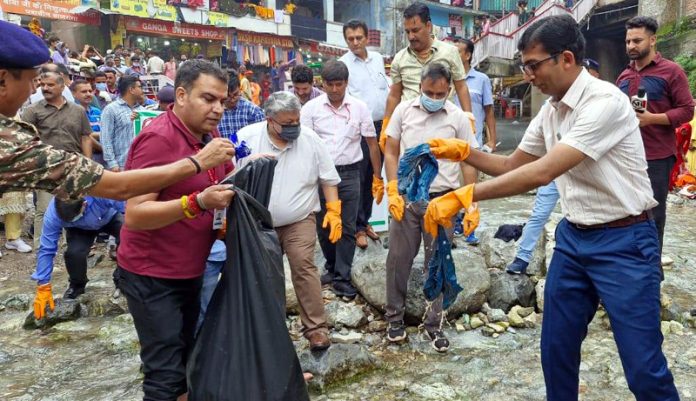Excelsior Correspondent
KATRA, Aug 7: Shri Mata Vaishno Devi Shrine Board, in collaboration with local authorities, has launched a comprehensive cleanliness campaign of the Banganga rivulet under the nationwide Swachhta Pakhwada initiative.
This campaign aligns with the broader objectives of the Swachh Bharat Mission, aiming to foster a clean and green environment besides, maintaining the sanctity and cleanliness of the holy river.
The drive was led by Anshul Garg, Chief Executive Officer, Shri Mata Vaishno Devi Shrine Board, in the presence of Vishesh Paul Mahajan, Deputy Commissioner Reasi with the Swachhta Pledge being taken by all the participants who included officers / officials from Shrine Board and local authorities, prominent citizens of Katra and others. They collectively removed litter / debris and silt from the rivulet.
On the occasion, the CEO said that the cleanliness drive under Swachhta Pakhwada is undertaken to ensure that the Banganga rivulet which is an integral part of the pilgrimage route remains clean and free from pollution. He added that in a bid to enhance the spiritual and aesthetic experience of devotees, the Shrine Board is also conceiving a plan to start a Banganga Arti and Multimedia Laser Show at its embankment.
The CEO underscored that by fostering a culture of cleanliness and sustainability, the Board hopes to inspire lasting positive change and contribute to the realization of the Swachh Bharat Mission. He also emphasized the importance of maintaining cleanliness and sanitation in the holy town and urged locals and pilgrims to cooperate in keeping the area clean.
Notably, the Shrine Board has taken various initiatives for ensuring sanitation and cleanliness along the tracks and conservation of environment and ecology of Trikuta Hills. These measures include setting up a mule dung based biogas plant at Banganga, Sewage Treatment Plants at various locations on the track for waste water treatment and for green initiative the construction of water harvesting ponds, afforestation drives in Trikuta Hills, recycling of sewage treatment plants and rooftop rainwater harvesting etc. In addition, the Shrine Board has been planting more than 1.50 lakh seedlings every year in the forest area for retention of water and prevention of soil erosion.


